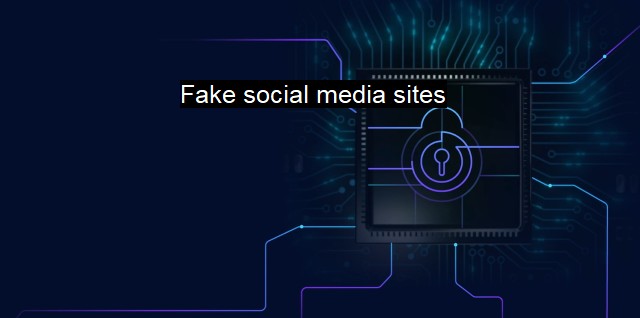What are Fake social media sites?
The Rise of Fake Social Media Sites: The Complications of Cybersecurity in a Streamlined Digital Sphere
In the domain of cybersecurity, the term "fake social media sites" pertains to counterfeit web platforms designed to mimic credible social media networks such as Facebook, Twitter, Instagram, LinkedIn, and others for baleful intentions. Cybersecurity specialists identify these sites as constituting one of the surging black-hat methods that cybercriminals leverage to deceive, manipulate and steal data from unwitting internet users.Fake social media sites configured by hackers often appear deceptively genuine, which allows these malicious entities to deceive hundreds or an infinite number of unsuspecting users into voluntarily surrendering their personal credentials and other sensitive data, such as credit card numbers, bank account information, personal contact information, usernames, and passwords.
In cybersecurity context, these fraudulent sites are residential places for an array of destructive malwares and viruses. Consequently, it isn't unusual for a malware or virus to be installed secretly onto a victim's device upon merely visiting a fake social media site. Spyware, Trojans, and ransomware constitute some of the common types of malware used.
These sites typically present bait content, such as sensational news or a binding request to update one's login details or credit card info. Under the guise of an authentic social media site, they trick the user into entering their personal information onto the site, which is then nabbed by the cybercriminals in real-time. It's a common type of phishing scam used in the realm of cybercrime.
Also, these sites are often propagated with bot accounts, typically showcasing sensible identities to thread concocted reviews, make spam posts, sway individual's sentiments, sow discord, or carry out countless damaging activities that are undesirable and inflict social, personal, or economic harm.
From a cybersecurity perspective, the existence of fake social media sites throws massive challenges, particularly concerning data privacy and identity theft. By mimicking trusted sites and spoofing their security insignia, fake social sites can bypass and wreak the fundamental trust between users and carefully established security frameworks in online platforms and transactions.
Evidently, fake social media have discernible cybersecurity implications. Therefore, leading antivirus providers recognize the necessity for detailed protocols and proactive measures to protect users from said threats. The first line of defenses usually includes using comprehensive antivirus solutions that can recognize and block access to these dangerous sites. Some are designed to not just detect viruses and malware but also to alert users of sketchy, unsafe websites, and provide real-time browser protection against them.
Additional measures constitute ensuring all apps and browsers are updated with security patches, and adopting preventive habits like examining a website's address thoroughly before entering any data, fortifying passwords and activating two-factor authentication. Also, internet users are advised not to open any suspicious attachments or click on hyperlinks from unknown sources.
The battle against fake social media sites is increasingly a game of cat and mouse, given the ever-evolving sophistication and resilience of cybercriminals. Ensuring a safer cyber-environment requires introspection from social networking sites, system designers, users, and legislators to harmonize respective efforts towards superior designs, stringent legal constraints, and enlightened user behavior in the realms of cybersecurity.
Fake social media sites represent a significant threat in the cybersecurity landscape. They are platforms stratified with numerous cyber threats, from identity theft to the propagation of destructive malware. with the combined efforts of vigilant internet users, reliable antivirus solutions, regular updates, and sound legal and cybersecurity hygiene, we can ace the battle against the diseased and treacherous realm of fake social media sites.

Fake social media sites FAQs
What are fake social media sites?
Fake social media sites are websites that appear to be legitimate social media platforms, but are actually created by cybercriminals to steal personal information or spread malware.How can I spot a fake social media site?
Fake social media sites often have a few tell-tale signs, such as a URL that is slightly different from the official site, poor grammar and spelling, and fake promotions or discounts. It's important to always double-check the URL and use a reputable antivirus software to help detect and block fake sites.What kind of threats can fake social media sites pose to my cybersecurity?
Fake social media sites can pose a variety of threats to your cybersecurity, including phishing attacks, where cybercriminals try to trick you into giving away personal information, and the spread of malware that can infect your device and steal sensitive data.What can I do to protect myself from fake social media sites?
To protect yourself from fake social media sites, it's important to always double-check the URL and use a reputable antivirus software that can detect and block fake sites. Additionally, avoid clicking on suspicious links, never give away personal information to untrusted sources, and stay informed about the latest cybersecurity threats and trends.| | A | | | B | | | C | | | D | | | E | | | F | | | G | | | H | | | I | | | J | | | K | | | L | | | M | |
| | N | | | O | | | P | | | Q | | | R | | | S | | | T | | | U | | | V | | | W | | | X | | | Y | | | Z | |
| | 1 | | | 2 | | | 3 | | | 4 | | | 7 | | | 8 | | |||||||